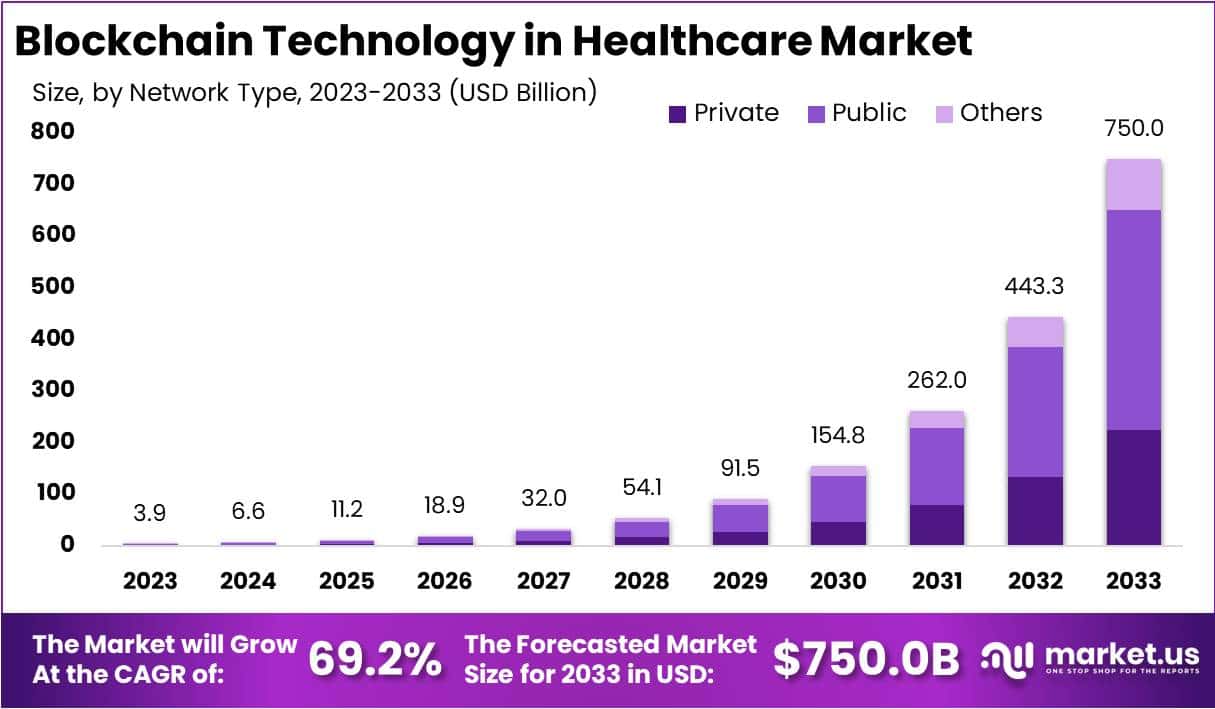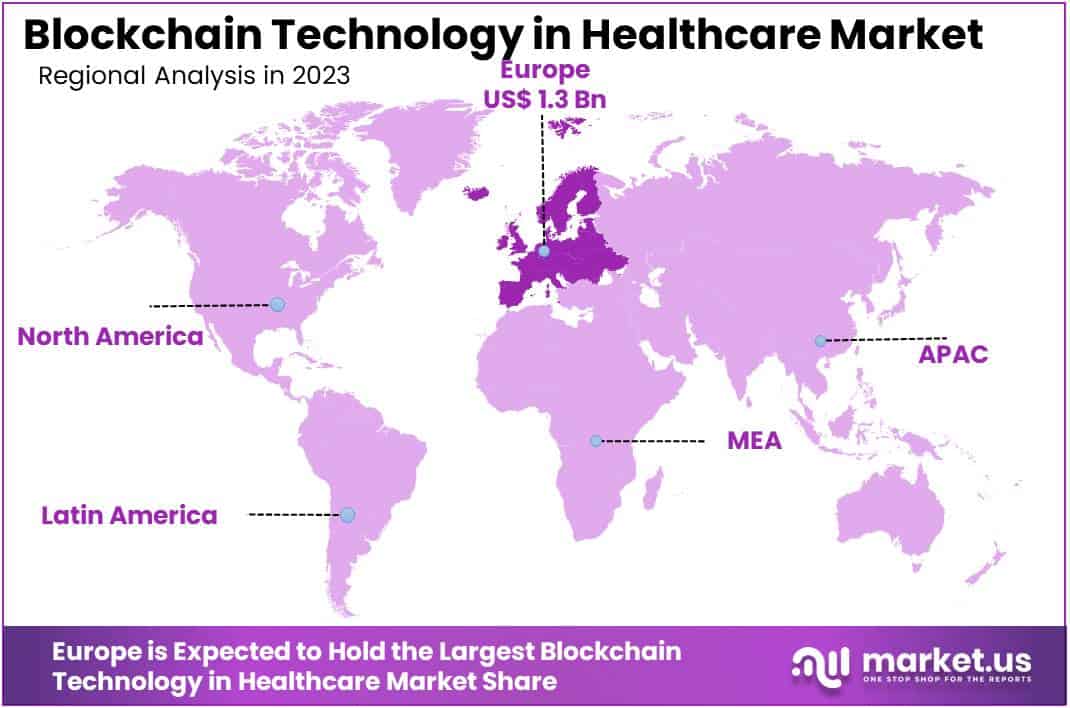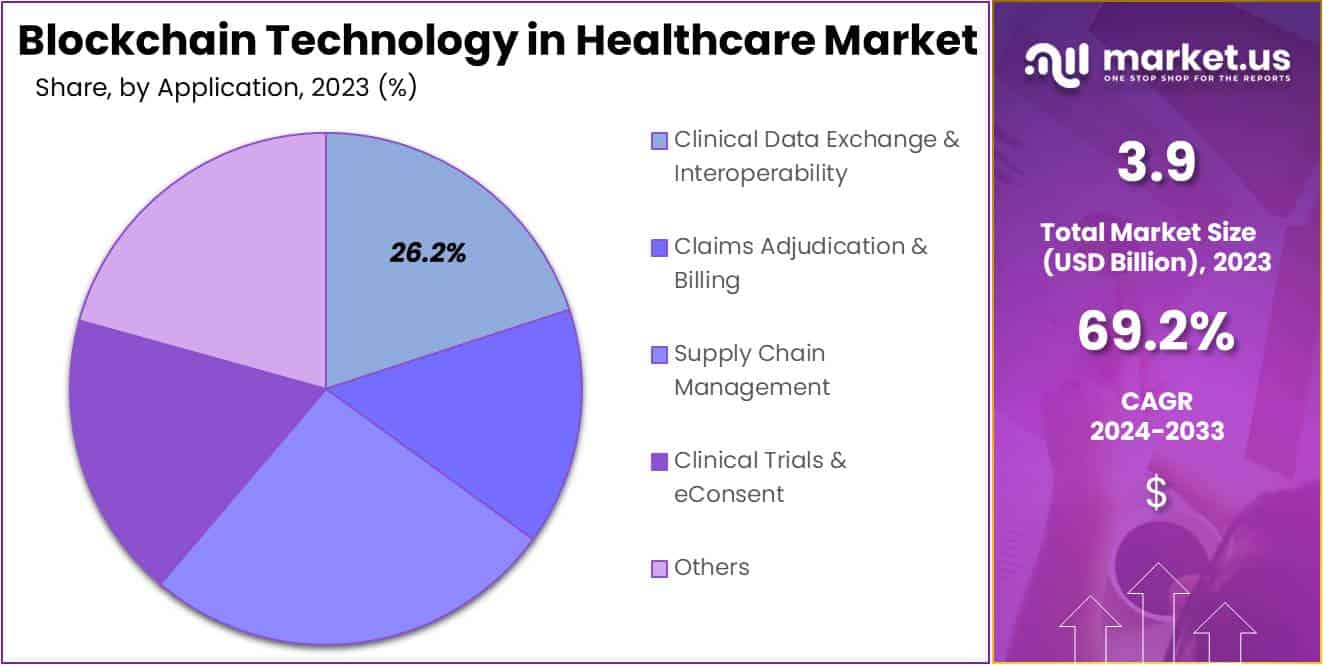New York, Jan. 11, 2024 (GLOBE NEWSWIRE) -- According to the market.us, the Blockchain Technology in Healthcare Market size is projected to reach around USD 750 billion by 2033, indicating substantial growth when compared to the 2023 valuation of USD 3.9 billion. This remarkable expansion is anticipated to occur at a Compound Annual Growth Rate (CAGR) of 69.2% during the forecast period from 2024 to 2033.
Blockchain technology is making significant strides in healthcare, employing decentralized ledgers for heightened security and streamlined processes. This digital ledger, comprised of linked and encrypted transaction blocks, ensures data integrity. It promotes interoperability, offering a standardized and secure channel for healthcare entities to exchange information. Patients gain control over their health data, dictating access permissions. Administrative processes like billing and supply chain management benefit from blockchain, enhancing efficiency and reducing costs. Smart contracts automate agreements, particularly useful in insurance claims and billing, minimizing intermediary involvement.
Blockchain Technology in Healthcare Market caters to industry-specific solutions and services, experiencing growth as its advantages in data security and efficiency gain recognition. Key components include Platform Providers, Application Developers, Service Providers, and Regulatory Compliance Solutions. Market drivers include the demand for secure health data, regulatory support, and increasing digital health adoption. Challenges involve regulatory uncertainty and the need for industry collaboration.
MDS Mexico launched a Blockchain-based COVID-19 test service in October 2021, enhancing vaccination certificate authenticity verification. The pandemic has accelerated healthcare adoption. IBM's Rapid Supplier Connect and China's hospitals implementing blockchain for COVID-19 medication tracking highlight practical applications. Blockchain is an emerging technology, with stakeholders proposing use cases to increase awareness. IBM's low-cost platform for startups and initiatives like Synaptic Health Alliance with major healthcare companies reflect growing market interest. HMS Holdings and technology providers like Cerner and Allscripts explore blockchain's potential to revolutionize healthcare problem-solving, driving market growth.
The report provides a full list of key companies, their strategies, and the latest developments. Download a PDF Sample before buying @ https://market.us/report/blockchain-technology-in-healthcare-market/request-sample/

Key Takeaway:
- Anticipated Market Growth: Projected to achieve a USD 750 billion valuation by 2033, showcasing an impressive 69.2% Compound Annual Growth Rate (CAGR) from 2024 to 2033, surpassing the 2023 valuation of USD 3.9 billion.
- Analysis of Network Types: The public segment takes the lead with a 56.8% market share, underscoring the significance of data sharing.
- Application Landscape: Supply Chain Management emerges as the dominant segment with a 26.2% market share.
- End-user Perspective: Biopharmaceutical & Medical Device Companies lead the pack with a commanding 41.4% market share.
- Regional Leadership: Europe asserts dominance with a 33% market share and a value of USD 1.3 billion, driven by advanced infrastructure and GDPR compliance. North America and Asia-Pacific intensify efforts to narrow the gap.
Factors affecting the growth of the Blockchain Technology in Healthcare industry
Various factors influence the growth of Blockchain Technology in the Healthcare market are;
- Security and Privacy Concerns: Security and privacy are critical factors in the healthcare industry. Blockchain's decentralized and immutable nature ensures data integrity and prevents unauthorized access. The use of cryptographic techniques in blockchain enhances the security of health records, protecting sensitive patient information from potential breaches. As healthcare organizations increasingly prioritize data security, the adoption of blockchain technology becomes more attractive.
- Interoperability and Data Standardization: Healthcare systems often struggle with interoperability issues, hindering the seamless exchange of medical data among different entities. Blockchain's ability to create a unified and standardized platform for data sharing can address interoperability challenges. By providing a common framework for data storage and exchange, blockchain facilitates the integration of diverse healthcare systems, leading to improved collaboration and more efficient patient care.
- Data Integrity and Traceability: Maintaining the integrity of healthcare data is crucial for accurate diagnoses and effective treatment plans. Blockchain's distributed ledger technology ensures the immutability and transparency of data, reducing the risk of errors or fraudulent activities. The ability to trace the origin and changes made to each piece of information is particularly valuable in healthcare, where the accuracy of patient records can have a direct impact on medical outcomes.
- Regulatory Compliance and Smart Contracts: The healthcare industry is subject to strict regulatory standards to protect patient rights and ensure quality care. Blockchain can streamline compliance processes by providing a tamper-resistant record of transactions. Smart contracts, self-executing contracts with the terms of the agreement directly written into code, can automate and enforce compliance with regulatory requirements. This can lead to greater efficiency in areas such as insurance claims processing, reducing administrative overhead and improving overall regulatory adherence.
Regional Analysis
In 2023, Europe emerged as the leader in the global blockchain technology in the healthcare market, commanding an impressive 33% share and reaching a market value of USD 1.3 billion. The reason for this domination is the extensive use of digital technologies and sophisticated healthcare infrastructure, which have made the perfect conditions for the effective implementation of blockchain technology. Governments and healthcare organizations in Europe made significant investments in technology-driven projects, creating an environment that supported the creation of blockchain applications. Healthcare firms are turning to blockchain for secure and transparent data management, assuring compliance, in response to stricter data protection rules, such as GDPR. Innovative solutions suited to regional healthcare concerns were the result of collaborations among European healthcare institutions, research groups, and blockchain suppliers. North America and Asia-Pacific are aggressively bridging the gap through strategic partnerships, research expenditures, and legislative breakthroughs while Europe continues to hold the lead.
Uncover the actionable insights tailored for your business strategy. Request our brochure to get more https://market.us/report/blockchain-technology-in-healthcare-market/#inquiry
Scope of the Report
| Report Attributes | Details |
| Market Value (2023) | USD 3.9 Billion |
| Forecast Revenue 2033 | USD 750 Billion |
| CAGR (2024 to 2033) | 69.2% |
| Europe Revenue Share | 33% |
| Base Year | 2023 |
| Historic Period | 2018 to 2022 |
| Forecast Year | 2024 to 2033 |
Market Drivers
Blockchain technology has gained widespread acceptance in the healthcare sector, addressing the escalating concern for data security. Its decentralized and immutable nature ensures tamper-proof integrity of patient records, serving as a robust safeguard. This unique tool empowers healthcare data management organizations to uphold confidentiality and trustworthiness. Acting as a catalyst, blockchain enhances interoperability among diverse healthcare systems, fostering seamless data sharing among providers. This not only promotes collaboration but also reduces redundant tests, ultimately enhancing patient care. Furthermore, blockchain proves instrumental in optimizing healthcare operations, streamlining administrative tasks, billing, claims processing, and supply chain management. The technology's transparency and efficiency lead to cost savings, fortifying healthcare infrastructures. Additionally, the integration of smart contracts within blockchain revolutionizes healthcare transactions, automating processes like insurance claims and payment settlements. This innovation reduces errors and accelerates transaction processes, exemplifying a transformative advancement in healthcare efficiency.
Market Restraints
Healthcare organizations confront distinctive challenges hindering the seamless integration of blockchain technology. Stringent regulatory frameworks contribute to uncertainty and slow adoption as institutions grapple with evolving compliance requirements. Legacy system compatibility issues further impede progress, as outdated hospital systems prove time-consuming and costly to integrate with blockchain. Interoperability suffers due to a lack of standardized protocols, limiting the technology's potential benefits. Industry-wide standards are crucial for addressing these challenges effectively. Privacy concerns add complexity, as the transparency inherent in blockchain may clash with regulations, necessitating a delicate balance between transparency and patient privacy. Successfully navigating these hurdles is essential for healthcare institutions aiming to implement blockchain successfully.
Market Opportunities
Blockchain is reshaping healthcare supply chain management by enhancing transparency and traceability, safeguarding against counterfeit medical products. This transformative technology ensures authenticity, fostering a safer supply chain. In the realm of telemedicine, blockchain's decentralized nature empowers patients with greater control over their medical data, facilitating improved communication with healthcare providers. This patient-centric approach strengthens interdisciplinary collaboration. Additionally, blockchain accelerates medical research by revolutionizing clinical trial data management, offering a secure and transparent platform. This not only streamlines processes but also reduces the risk of fraud, potentially cutting clinical trial costs by around 20%. Beyond institutional benefits, blockchain empowers individuals through decentralized healthcare apps, enabling active management of health records, appointments, and wellness tracking. This shift towards patient-centric applications enhances individual engagement in well-being management.
Immediate Availability | Purchase Your Copy of This Exclusive Research Report https://market.us/purchase-report/?report_id=48700
Report Segmentation of the Blockchain Technology in Healthcare Market
Network Type Insight
In 2023, the global blockchain technology in healthcare market witnessed a remarkable landscape, notably led by the Public segment, securing a commanding 56.8% market share. This dominance can be attributed to the transparent and open nature of public blockchain networks, fostering seamless data sharing among diverse stakeholders in healthcare ecosystems. The Public segment, characterized by decentralized networks accessible to all, experienced swift expansion, proving particularly attractive to healthcare providers aiming to streamline processes and enhance patient care through efficient information exchange. Concurrently, Private blockchains played a crucial role in ensuring healthcare data protection and privacy, catering to organizations prioritizing compliance. These restricted-access solutions gained attention as part of robust privacy strategies. Additionally, the emerging alternatives in the Others category, such as consortium-based or hybrid networks, displayed promising potential in diversifying blockchain applications within healthcare, offering tailored value propositions aligned with industry needs.
Application Insight
In 2023, Supply Chain Management emerged as a dominant force, securing a remarkable 26.2% market share in the blockchain technology for healthcare sector. Its success is attributed to the pivotal role played by blockchain in enhancing transparency and efficiency within healthcare supply chains. Another significant player was Clinical Data Exchange & Interoperability, holding substantial market share by facilitating seamless sharing and integration of clinical data. Claims Adjudication & Billing experienced notable expansion due to its automation capabilities, offering reliable billing platforms for healthcare providers. Additionally, Clinical Trials & eConsent gained traction, showcasing blockchain's growing adoption for managing and safeguarding clinical trial data. Beyond these, blockchain is catalyzing healthcare innovation in areas such as patient data security and administrative efficiency, reflecting a multifaceted impact on the industry. The market's evolution is not only driven by efficiency gains but also by a collective commitment to ensuring integrity, security, and smooth exchange of vital healthcare information.

End-User Insight
In 2023, Biopharmaceutical and Medical Device Companies emerged as frontrunners in the healthcare blockchain sector, seizing a commanding 41.4% market share. Their dominance stems from adeptly employing blockchain solutions to enhance operational efficiency across the diverse realms of biopharmaceuticals and medical devices. Concurrently, healthcare providers secured a significant market share, experiencing notable growth due to improved data management, interoperability, and heightened security measures. Payers, including insurers and financial stakeholders, displayed fervent interest in blockchain applications, focusing on optimizing claims processing, fraud reduction, and ensuring transparent transactions. The broader spectrum of stakeholders, categorized as Others, including research institutions, regulatory bodies, and technology vendors, showcased a growing recognition of blockchain's versatile benefits, attaining a substantial market presence by 2023. This underscores blockchain's widespread applicability across various facets of the healthcare industry.
Get PDF Sample for Technological Breakthroughs@ https://market.us/report/blockchain-technology-in-healthcare-market/request-sample/
Recent Developments in the Blockchain Technology in Healthcare Market
- December 2023: BurstIQ and Lytics Health merge, combining advanced AI healthcare analytics with blockchain-based data security.
- November 2023: Guardtime introduces Keyless Trust Anchor Service for tamper-proof evidence of data integrity in pharmaceutical supply chains.
- October 2023: iSolve acquires MedLedger, expanding its blockchain platform for clinical trial management and patient data privacy.
- September 2023: PATIENTORY Inc. and Health Gorilla partner for seamless integration between the patient engagement platform and interoperability network.
Market Segmentation
Network Type
- Private
- Public
- Others
Application
- Clinical Data Exchange & Interoperability
- Claims Adjudication & Billing
- Supply Chain Management
- Clinical Trials & eConsent
- Others
End-user
- Providers
- Payers
- Biopharmaceutical & Medical Device Companies
- Others
By Geography
- North America
- US
- Canada
- Europe
- Germany
- France
- The UK
- Spain
- Italy
- Russia
- Netherland
- Rest of Europe
- Asia Pacific
- China
- Japan
- South Korea
- India
- New Zealand
- Singapore
- Thailand
- Vietnam
- Rest of APAC
- Latin America
- Brazil
- Mexico
- Rest of Latin America
- Middle East & Africa
- South Africa
- Saudi Arabia
- UAE
- Rest of MEA
Competitive Landscape
In the dynamic healthcare landscape, the adoption of blockchain technology is driven by influential players committed to addressing industry challenges. IBM, a tech giant, leverages its expertise to enhance data security, transparency, and interoperability, revolutionizing health information management. Patientory Inc. focuses on patient-centric applications, empowering individuals to manage and secure their health data, aligning with the industry's emphasis on patient engagement. Guardtime ensures tamper-proof data integrity in health records, crucial for maintaining trust. iSolve LLC streamlines healthcare processes, reducing costs and enhancing efficiency, benefiting providers and patients alike. Other contributors with diverse perspectives foster a competitive environment, driving innovation in blockchain applications for healthcare.
Market Key Players
- IBM
- PATIENTORY INC.
- Guardtime
- iSolve LLC
- Solve.Care
- Oracle
- Change Healthcare
- BurstIQ
- Medicalchain SA
- Blockpharma
Browse More Related Reports
- Digital health market size is to be worth around USD 1,190.4 Bn by 2032 from USD 264.1 Bn in 2023, at a CAGR of 16.7% from 2023 to 2032.
- eHealth market size is expected to be worth around USD 393.6 billion by 2032 from USD 97.4 billion in 2022.
- Healthcare Cybersecurity Market Size Was To Reach USD 19.1 Bn In 2022 And Projected To Reach USD 93.6 Bn by 2032 at a CAGR of 17.7%.
- Connected Healthcare Market size is expected to be worth around USD 520.6 Billion by 2032 from USD 58.2 Billion in 2022, at a CAGR of 25.2%.
- Healthcare IT market size is expected to be worth around USD 1,728 Bn by 2032 from USD 374 Bn in 2023, at a CAGR of 17% from 2023 to 2032.
- Biostimulant Market size is expected to be worth around USD 5.6 Bn by 2033 from USD 2.7 Bn in 2023, at a CAGR of 7.5% from 2024 to 2033.
- Alzheimer’s disease therapeutics Market size is expected to be worth around USD 24.3 Billion by 2032 from USD 4.6 Billion in 2022.
- Microfluidics Market size is expected to be worth around USD 102.9 Billion by 2033 from USD 32.2 Billion in 2023
- Global 3D Cell Culture Market size is expected to be worth around USD 6,529 Million by 2032 from USD 1,700 Million in 2022, at CAGR of 14.8%.
- Alopecia Market size is expected to be worth around USD 24.7 Bn by 2033 from USD 9.1 Bn in 2023, at a CAGR of 10.5% from 2024 to 2033.
About Us:
Market.US (Powered by Prudour Pvt Ltd) specializes in in-depth market research and analysis and has been proving its mettle as a consulting and customized market research company, apart from being a much sought-after syndicated market research report-providing firm. Market.US provides customization to suit any specific or unique requirement and tailor-makes reports as per request. We go beyond boundaries to take analytics, analysis, study, and outlook to newer heights and broader horizons.
Follow Us on LinkedIn
Our Blog:
